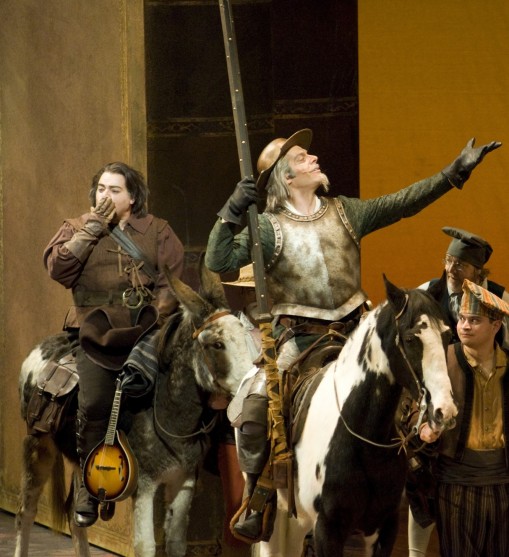Seattle Opera serves up an energetic and deeply affecting “Don Quichotte”

Eduardo Chama as Sancho Panza and John Relyea in the title role of Seattle Opera's "Don Quichotte." Photo: Rozarii Lynch
It’s a safe bet that nearly all the opera fans flocking to Seattle Opera’s Don Quichotte are seeing a production of Massenet’s seldom-staged work for the first time.
Indeed, it’s the first time in Seattle Opera general director Speight Jenkins’ 27 years with the company that he is staging an opera he has never before seen, which tells you how much he wanted to present a starring vehicle for the young bass-baritone John Relyea. A particular favorite in Seattle, Relyea won the company’s Artist of the Year award in 2005 (for his dazzling Tales of Hoffmann villains). And at Wednesday night’s performance Relyea did not disappoint.
Resonant, velvety and expressive, his voice rolled out into every corner of McCaw Hall. Relyea’s portrayal of Quichotte found a well-judged balance between doddering oldster and dignified suitor; he moved like an old man, but never like a comic figure. The comedy was reserved for his expert sidekick, Eduardo Chama, who as the loyal Sancho Panza proved an ideal partner for Quichotte.
Seattle Opera has been particularly lucky with Polish singers (with memorable performances from the likes of Mariusz Kwiecien, Ewa Podles, and Aleksandra Kurzak), and Polish-born mezzo-soprano Malgorzata Walewska added to that string of successes with a remarkable Dulcinée.
The object of Quichotte’s obsession, she first appears from a crowd of admirers in a Violetta-like turn, full of coloratura swoops and roulades, yet here Walewska’s ripe, opulent voice handled the fireworks with only moderate success. Later, however, her real strengths came forward: warm beauty of tone, an imposing and well-focused lower register, and acting skills that made the scene in which she rejects Quichotte deeply moving.
Indeed, for all the humorous touches, this is a show that has a surprisingly high handkerchief quotient. Those who didn’t sniffle a bit at the scene in which Quichotte commends his soul to God as he faces down a squad of brigands (who fall to their knees in respect), will likely do so at the Don’s understated and extraordinarily touching death scene.
All this was underscored by one of the finest young opera conductors to arrive in Seattle in years: Carlo Montanaro, whose energy and musical sensitivity were manifest in every line of the score and served the cast remarkably well. He knows right down to the sixteenth-note when to back off and when to surge forward as each singer moves through their arias.
The stage direction, in the secure hands of Linda Brovsky, has the cast and chorus moving over, through and out of stacks of enormous books on the otherwise spare Donald Eastman set – reminding us both of the Cervantes novel (and a subsequent play by Jacques Le Lorrain) from which the opera takes its story, and of Quichotte’s own obsession with literature.
The choreography, by veteran dancer Sara de Luis, is imaginative, thoroughly redolent of Spain, and woven into every aspect of the production. The dancers don’t just arrive onstage for their numbers, but are an integral part of the cast, observing and participating in all the action, and then leaping forward for their own star turns. De Luis herself, who has been dancing professionally for about five decades, was a marvel to watch: pliant, fiery, and riveting.
Riveting, too, were the horse and donkey on which Quichotte and Sancho made their entrance. It was hard to focus on anything else when Millie the donkey (as Sancho’s Dapple) and Desperado the pinto (as Quichotte’s Rocinante) were onstage, tossing their heads, swishing their tails and munching on covertly-awarded treats. Fortunately they committed no indiscretions, but one was nonetheless reminded of why W.C. Fields warned fellow thespians against working with animals or children.
Seattle Opera presents Massenet’s Don Quichotte through March 12 at McCaw Hall, 321 Mercer St., Seattle; tickets are $25-$191 (800-426-1619 or seattleopera.org).